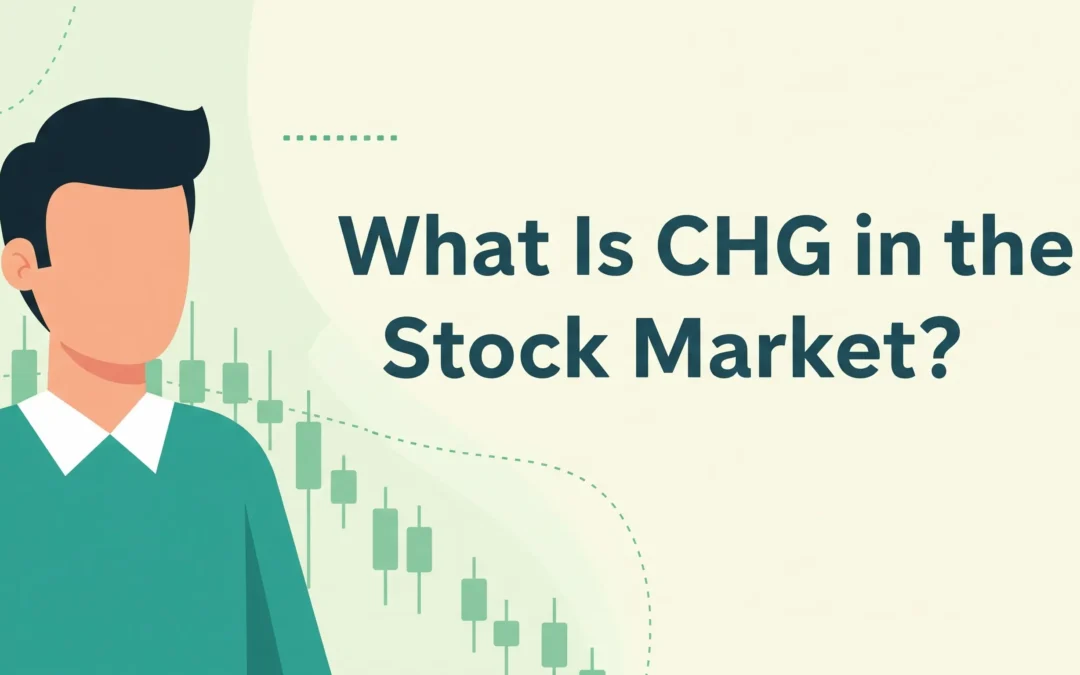If you spend any time looking at stock market numbers, whether it’s on your trading app, a business news channel, or an online stock site, you’ve seen abbreviations like CMP, LTP, and CHG.
It helps investors quickly grasp how a stock or an entire index is performing
Throughout the trading day, giving them a much better feel for those daily ups and downs and what the current trend looks like.
Full Form of CHG:
CHG stands for “Change”.
When we talk about the stock market, it’s all about how much a stock, an index, or even some other financial tool has changed in price since its last closing mark (that is, compared to the previous trading session’s close)
What Does CHG Indicate?
CHG indicates how much the price has gone up or down since the previous trading session ended. It gives a quick understanding of the market’s sentiment towards a particular stock or the market as a whole.
This change is usually expressed in two ways:
- Numerical Change (e.g., ₹+9 or ₹–06.26)
- Percentage Change (e.g., +7.2% or –06.3%)
Both values are shown side by side for better understanding and to keep it simple.
Consider an Example for understanding “CHG”:
Imagine a company’s stock wrapped up yesterday at ₹500. Now, today, you see it trading at ₹525.
To check out the CHG, you just do a quick bit of math:
CHG = ₹525 (Today’s Current Price) – ₹500 (Yesterday’s Closing Price) = ₹+25 (Difference)
Now calculating the difference in the percentage:
Percentage CHG = (₹25 ÷ ₹500) × 100 = +5%
On your screen, you will be able to see the CHG:
CHG: ₹+25.00 (+5.00%)
This instantly tells you the stock has jumped up by ₹25, or a solid 5%, compared to where it finished yesterday.
Now, what if the opposite happened? If that same stock had dipped down to ₹485, your display would show:
CHG: ₹–15.00 (–3.00%)
Where Do You See CHG?
You’ll find CHG mentioned in:
- Stock Broker (like Zerodha, Upstox, Groww)
- Financial news Channels (CNBC TV18, ET Now)
- Latest Market news websites (like NSE India, BSE India, Moneycontrol)
It appears in both stock-specific data and market index summaries (like Nifty 50 or Sensex, and all the stocks listed in the market).
Why Is CHG Important?
CHG gives investors a real-time sense of direction:
- A positive CHG means the stock is gaining value.
- A negative CHG means the stock is losing value.
This helps in:
- Quickly figuring out if prices are heading up or down
- Deciding on the trades you want to make right now
- Gauging how the market’s feeling, especially after big news drops
For example, if a company’s earnings report was better than expected, the CHG may show a strong positive number, indicating investor optimism.
| Term | Meaning |
| LTP (Last Traded Price) | It’s the price from the stock’s most recent trade. |
| CMP (Current Market Price) | Same as LTP; often being updated as the stock or index is traded. |
| CHG (Change) | How much did it move from yesterday’s close to today’s current price? |
| %CHG (Percentage Change) | The CHG figure, shown as a percentage of yesterday’s closing price. |
Things to Keep in Mind:
- CHG resets daily: It only compares today’s price to yesterday’s close. It doesn’t show long-term performance.
- Big changes aren’t always meaningful: Be prepared for CHG numbers to swing sharply when earnings reports come out, the budget is announced, or big global events happen.
- Market volatility affects CHG: The volatility hits the market when there are large quantities of orders placed, which usually happens when there are some announcements like Quarterly results, Government budget announcements, or some big news in the Global markets, which would eventually affect the volatility of the market.
In Closing:
In the end, every trade you make is subject to government taxes like Securities Transaction Tax (STT) and Commodities Transaction Tax (CTT). While CHG is just a price indicator and not a tax, staying informed about all these charges and market changes is your best bet.
The world of finance, especially here in India, is constantly evolving. Lending, for example, is becoming incredibly smart and personalized, moving way past just your credit score. That’s a good thing, because whether you’re dreaming of a home in Bengaluru (even with those climbing prices!) or just need a quick loan for an emergency, you’ve now got more flexible options than ever before.


